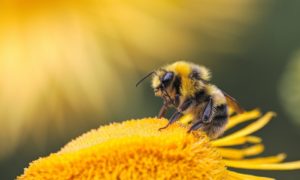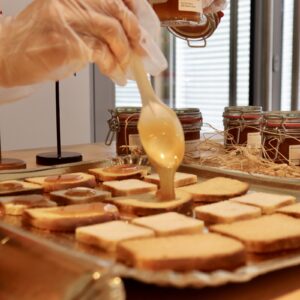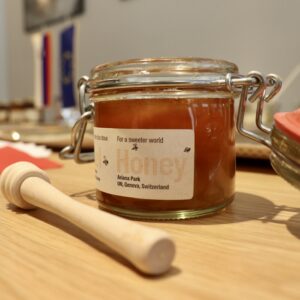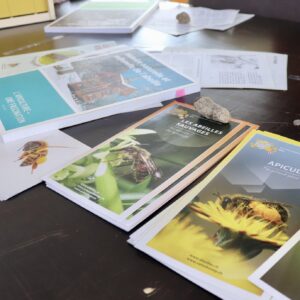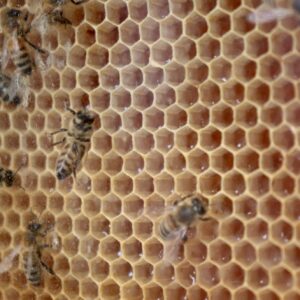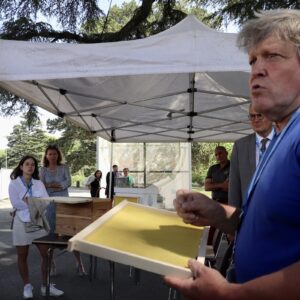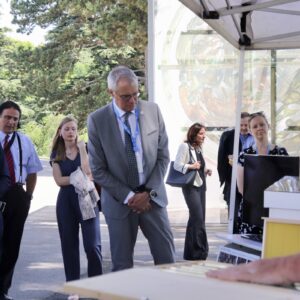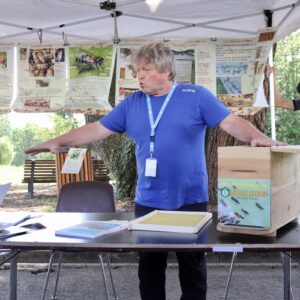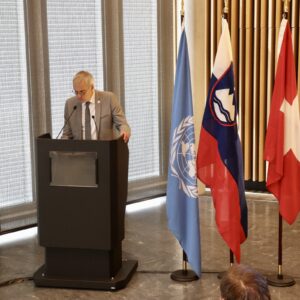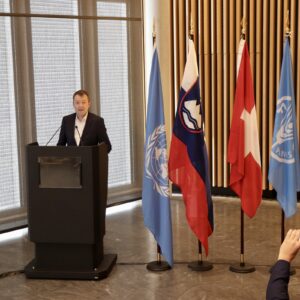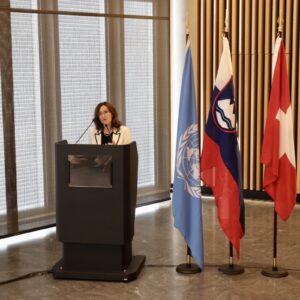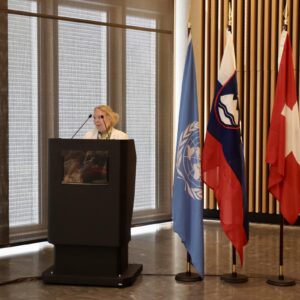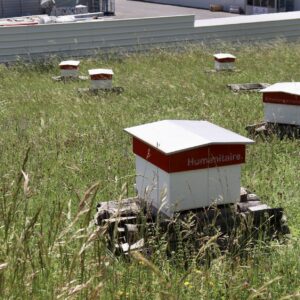Update
World Bee Day
World Bee Day is celebrated each year on 20 May to raise awareness of the importance of bees as pollinators, the threats they face and their contribution to sustainable development. This year, the theme is Bee engaged in pollinator-friendly agricultural production.
About
For centuries bees, among the hardest working creatures on the planet, have benefited people, plants and the environment. By carrying pollen from one flower to another, bees and other pollinators enable not only the production of an abundance of fruits, nuts and seeds, but also more variety and better quality, contributing to food security and nutrition. To raise awareness of the importance of pollinators, the threats they face and their contribution to sustainable development, the United Nations designated 20 May as World Bee Day.
The goal is to strengthen measures aimed at protecting bees and other pollinators, which would significantly contribute to solving problems related to the global food supply and eliminate hunger in developing countries. We all depend on pollinators and it is, therefore, crucial to monitor their decline and halt the loss of biodiversity.
Pollinators
Pollinators such as bees, birds and bats, affect 35 per cent of the world’s crop production, increasing outputs of 87 of the leading food crops worldwide, plus many plant-derived medicines. Three out of four crops across the globe producing fruits or seeds for human use as food depend, at least in part, on pollinators. Bees and other pollinators, such as butterflies, bats and hummingbirds, are increasingly under threat from human activities.
Pollination is, however, a fundamental process for the survival of our ecosystems. Nearly 90 per cent of the world’s wild flowering plant species depend, entirely, or at least in part, on animal pollination, along with more than 75 per cent of the world’s food crops and 35 per cent of global agricultural land. Not only do pollinators contribute directly to food security, but they are key to conserving biodiversity.
Observance
This United Nations celebration raises awareness of the essential role bees and other pollinators play in keeping people and the planet healthy, and on the many challenges they face today. FAO has been celebrating this day since 2018, thanks to the efforts of the Government of Slovenia with the support of the International Federation of Beekeepers’ Associations Apimondia, that led the UN General Assembly to declare 20 May as World Bee Day.
The date for this observance was chosen as it was the day Anton Janša (1734–1773), a pioneer of modern apiculture, was born. Janša came from a family of beekeepers in Slovenia, where beekeeping is an important agricultural activity with a long-standing tradition. The Austrian Empress Maria Theresa appointed him to the post of permanent teacher of apiculture at the new School of Beekeeping in Vienna. He became well known even before his death. After 1775, all state beekeeping teachers had to teach the subject in accordance with his teachings and methods.
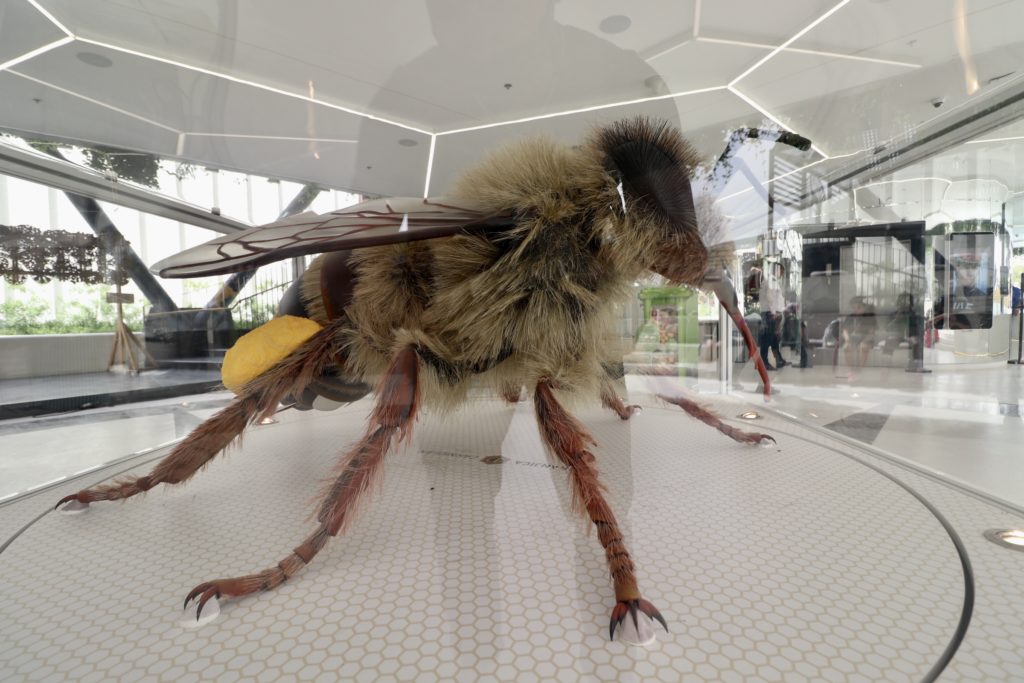
Giant representation of a bee in the Slovenia Pavilion at the Dubai World Expo 2020
Today bees, pollinators, and many other insects are declining in abundance. This day provides an opportunity for all of us – whether we work for governments, organizations or civil society or are concerned citizens – to promote actions that will protect and enhance pollinators and their habitats, improve their abundance and diversity, and support the sustainable development of beekeeping.
2023 Theme
Under the theme “Bee engaged in pollinator-friendly agricultural production”, World Bee Day 2023 calls for global action to support pollinator-friendly agricultural production and highlights the importance of protecting bees and other pollinators, particularly through evidence-based agricultural production practices.
The global World Bee Day ceremony, which will be held in hybrid format at the FAO headquarters on Friday, 19 May, will be an opportunity to raise awareness of the importance of adopting pollinator-friendly agricultural production practices to protect bees and other pollinators, while contributing to the resilience, sustainability and efficiency of agrifood systems.
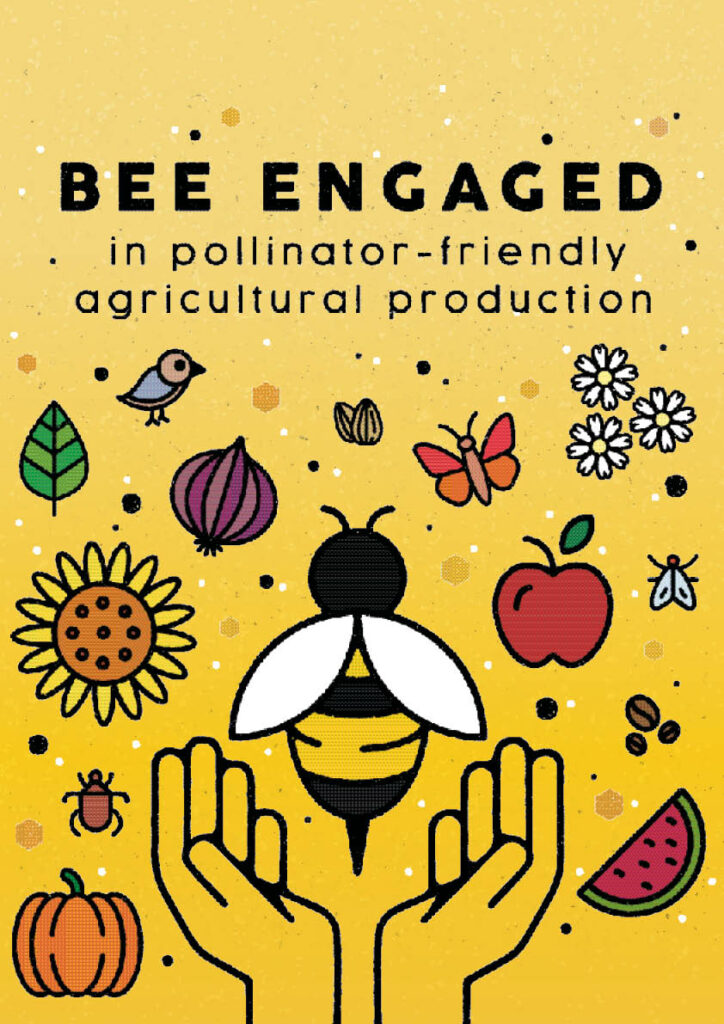
The Role of Geneva
Various international and local organizations in Geneva – listed below in alphabetical order – are engaged in the protection and conservation of our biological diversity, including pollinators.
International Geneva
Convention on International Trade in Endangered Species of Wild Fauna and Flora (CITES)
CITES is a multilateral agreement aiming to ensure that international trade in specimens of wild animals and plants does not threaten their survival. As of today, it accords varying degrees of protection to more than 37,000 species of animals and plants, whether they are traded as live specimens or objects.
International Trade Centre (ITC)
ITC is a development agency dedicated to supporting the internationalization of small and medium-sized enterprises (SMEs). The agency enables SMEs in developing and transition economies to become more competitive and connect to international markets for trade and investment, thus raising incomes and creating job opportunities. Through its “Green to Compete” strategy, ITC supports SMEs to contribute to a nature-positive economy through conservation & sustainable use of biodiversity.
International Union for Conservation of Nature (IUCN)
IUCN is the world’s largest conservation network with the mission to influence, encourage and assist societies throughout the world to conserve the integrity and diversity of nature. The IUCN Red List is the world’s most comprehensive information source on the global extinction risk status of animal, fungus and plant species.
Food and Agriculture Organization of the United Nations (FAO) Liaison Office Geneva
The Food and Agriculture Organization of the United Nations (FAO) is a specialized agency of the UN with a membership of 194 Member States that leads international efforts to eradicate hunger and malnutrition and sustainable management and utilization of natural resources. Its goal is to achieve food security for all, where everyone has regular access to enough high-quality food to lead active and healthy lives. The FAO Liaison Office in Geneva (FAO Geneva), located in the historical Palais des Nations, is one of more than 130 FAO offices worldwide, working with partners to achieve this goal and the wider sustainable development agenda.
Ramsar Convention on Wetlands
The Ramsar Convention aims to ensure the conservation and wise use of all wetlands through local and national actions and international cooperation, as a contribution toward achieving sustainable development throughout the world. Although wetlands cover only around 6% of the Earth’s surface, they provide vital habitats for 40% of the world’s species. Wetlands support pollinators during different stages of their life cycle.
The Economics of Ecosystems and Biodiversity (TEEB)
TEEB is a global initiative focused on making nature’s values visible. Its principal objective is to mainstream the values of biodiversity and ecosystem services into decision-making at all levels. It aims to achieve this goal by following a structured approach to valuation that helps decision-makers recognize the wide range of benefits provided by ecosystems and biodiversity, demonstrates their values in economic terms and, where appropriate, and captures those values in decision-making.
United Nations Conference on Trade and Development (UNCTAD)
As part of its work on trade and the environment, UNCTAD has launched the BioTrade Initiative to support the objectives of the CBD. BioTrade refers to those activities of collection, production, transformation, and commercialization of goods and services derived from native biodiversity under the criteria of environmental, social and economic sustainability. Since 1996, the initiative has developed a unique portfolio of global, regional and country programmes as well as a network of partners and practitioners working in over 65 countries.
United Nations Economic Commission for Europe (UNECE)
UNECE promotes sustainable use and preservation of ecosystems by supporting the development of biodiversity conservation policies in the region, and the integration of nature conservation in sectoral policies. UNECE contributes to the work of the CBD through information and expertise, notably on forestry and environmental-economic accounting.
United Nations Conference on Trade and Development (UNCTAD)
In 1996, UNCTAD launched the BioTrade Initiative to support the objectives of the Convention on Biological Diversity. BioTrade refers to those activities of collection, production, transformation, and commercialization of goods and services derived from native biodiversity under the criteria of environmental, social and economic sustainability. This includes activities relying on forests and supporting the livelihoods of the people living in or adjacent to forests.
United Nations Office at Geneva (UNOG)
Adjacent to the Palais des Nations, the 46-hectare Ariana Park is one of the biggest and most prestigious in Geneva. In the heart of this area are 10 beehives donated by Switzerland on 10 September 2012, to celebrate the tenth anniversary of its accession to the United Nations. In 2019, the Swiss Confederation and the United Nations Office at Geneva shared 96 kilograms of honey produced by these bees. Ariana Park, as well as the City’s parks and gardens, are managed ecologically without any chemical products being used.
WWF International
WWF is one of the leading organizations in wildlife conservation and endangered species. Working in numerous countries around the globe, WWF collaborates with people to develop and deliver innovative solutions that protect communities, wildlife, and the places in which they live. WWF works to help local communities conserve the natural resources they depend upon; transform markets and policies toward sustainability, and protect and restore species and their habitats.
Local Geneva
Bioparc Genève
Located just a stone’s throw from the city centre, the Bioparc Geneva is home to 250 animals, a third of which are threatened species in the wild. Its team of wildlife experts and enthusiasts works for the conservation of animal species both locally and by supporting projects abroad. Open to visitors every day, the park offers many educational activities to raise awareness about the importance of biodiversity. It is a centre of competence and expertise on wild, local and exotic animals, carrying out research and training activities. On World Bee Day, they carry animations on the topic.
Canton of Geneva
Aware of the rich biodiversity of its territory, the Canton of Geneva has developed a Biodiversity Strategy 2030 to protect its natural ecosystems and the services they provide to its residents. Thanks to the presence of the lake and the forests, natural ecosystems in Geneva occupy a little more than a quarter of the cantonal territory, of which 2.7% is made up of protected areas. The Canton also developed the Nature in the City program, aiming to promote biodiversity and improve the living environment in urban spaces by maintaining and creating environments favourable to native flora and fauna. In collaboration with local associations and partners, the Canton also launched the platform Dans Ma Nature, a digital space to strengthen the awareness of the general public in favour of biodiversity.
City of Geneva
Green spaces make up nearly 20% of the territory of the City of Geneva. It includes the animal park in Bois-de-la-Bâtie, which participates in the conservation of local species and fosters contact between the urban population and the fauna of the region. The City of Geneva is implementing various practices to develop biodiversity in the urban environment, from green space management to the creation of environments favourable to indigenous flora and fauna and the elimination of pesticides.
Conservatory and Botanical Garden
With more than 200 years of history and fidelity to the spirit of its founders, the Conservatory and Botanical Garden of the City of Geneva (CJB) carries out its missions of exploration, research, education and protection, while continually enriching its collections, and ranks as one of the five most important in the world. The CJB offers to its numerous visitors a space of beauty and relaxation, of instruction on the conservation of a too-often, threatened nature while leading numerous regional, national and international research programmes, using the most modern techniques.
International Conference Centre of Geneva
The International Conference Centre of Geneva (CICG) is committed to sustainable development all year round. Part of this involved the purchase of four hives located on the first floor of the building and the rental of some hives to neighbours. These hives are sustainably maintained without chemicals and, thanks to proximity to the Botanical Garden, their honey is rich and floral. In 2018, 100 kg of honey were produced and put on sale at the CICG reception desk.
La Libellule
La Libellule is a non-profit association dedicated to raising public awareness of nature through two poles: field activities organized mainly in the Geneva region and a nature centre, an educational and meeting place, located in the heart of the city.
Museum of Natural History
With nearly 15 million specimens, the Museum‘s collection is the largest natural history museum in Switzerland, and among the most important in charge of natural science collections.
Pro Natura
Pro Natura is the oldest nature preservation organization in Switzerland, with several protected sites with important wildlife such as the Centre Nature Vallon de l’Allondon and the Centre Nature de la Pointe à la Bise in Geneva.
WWF Geneva
WWF Geneva works to implement projects in support of biodiversity, which includes a Panda Club that organizes outings and activities for young people on environmental issues.
Events
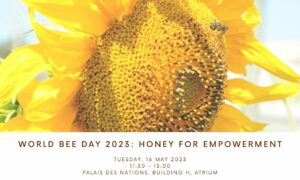
Geneva Celebration of World Bee Day 2023: Honey for Empowerment
FAO, Slovenia, Switzerland | 16 May 2023, 11:30–13:00 CEST | Palais des Nations, Building H, Lobby
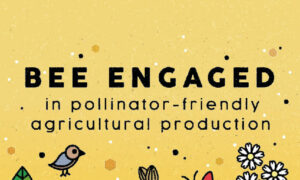
Global Celebration: Bee engaged in pollinator-friendly agricultural production
FAO | 10:00 – 11:30 CEST | FAO HQ, Rome, Italy & Online
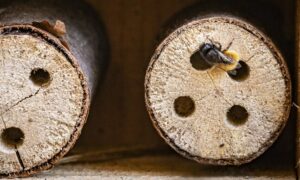
Les abeilles
NARIES & Commune de Chêne-Bougeries | 20 May 2023, 10:00-11:00 CEST | Parc des Falaises
Gallery
Celebration of World Bee Day 2022 “Honey for Hope” at the Palais des Nations.
Resources
- Publications by the FAO on the importance of pollinators
- Bees create a buzz at Palais des Nations | UNOG | 20 May 2020
- Good beekeeping practices for sustainable apiculture | FAO
- FAO’s Global Action on Pollination Services for Sustainable Agriculture
- “Buzzing with life” – or all you need to know about bees | UNDP
- Bee-ing grateful to our pollinators | FAO | 17 May 2018
- The power of pollinators: why more bees means better food | FAO | 24 August 2016
- Why we need bees for a nutritious future | FAO | 17 May 2019
- Money from honey | FAO | 30 September 2019
- Declining bee populations pose threat to global food security and nutrition | FAO | 20 May 2019
- Honey production in Guatemala: sweet success | UNDP | 15 March 2018
- FAO’s Global Action on Pollination Services for Sustainable Agriculture
- TARGET: Zero Hunger – The Power of Pollinators: Why More Bees Means Better Food | FAO
- IOM: Syrian Beekeeper Extracts Honey and Hope from Bees in Turkey | IOM

